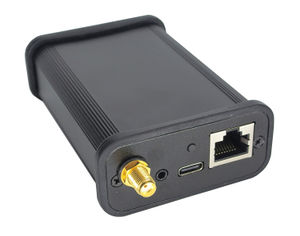Difference between revisions of "E1/T1 Interface"
(→Driver configuration) |
(→Driver configuration) |
||
| Line 49: | Line 49: | ||
How to find a serial number of connected icE1usb: | How to find a serial number of connected icE1usb: | ||
| − | <pre>sudo | + | <pre>sudo lsusb -d 1d50:6145 -v 2> /dev/null | grep iSerial</pre> |
Reload a service: | Reload a service: | ||
Revision as of 14:56, 6 October 2022
Contents
[hide]Why not TDMoIP / CESoIP?
Usual E1/T1 over IP protocols use generic frames over IP transfer that makes 2 megabits constant rate with up to 8000 packets per second. That approach:
- not suitable for distributed sites with limited internet access
- makes constant parasite load on the servers
- requires delays to compensate jitters
- has issues with asynchronous-to-synchronous transition
Fur such kind of integrations we prefer to have our own agent software on-site with hardware E1/T1 interfaces.
- good timings driven by E1/T1 clock or GPS
- good framing due to synchronous composition on the site
- less traffic due to transfer only valuable demultiplexed information
icE1usb
We have chosen Osmocom icE1usb as a primary interface for our projects for several reasons:
- good compatibility with big range of hardware hosts due to use USB
- in opposite to most of DAHDI interfaces it is in production
- open-source hardware design
- open-source user-space driver, no need for the kernel driver
- suitable API for our purposes
- available at Sysmocom's web shop
User manual can be found here.
Driver installation
We maintained Osmocom E1D in our Debian repository (amd64, arm64). It has no modifications so you can use any source of packages you want or build from the sources.
- sudo apt install osmo-e1d
Driver configuration
/etc/osmocom/osmo-e1d.cfg
- log syslog daemon
- e1d
- interface 0 icE1usb
- usb-serial [interface serial number]
- line 0
- line 1
More information about logging section can be found here, here and here.
(If you care about configuration file format, please check the sources here).
How to find a serial number of connected icE1usb:
- sudo lsusb -d 1d50:6145 -v 2> /dev/null | grep iSerial
Reload a service:
- sudo systemctl restart osmo-e1d
You can also test your configuration from the command line:
- sudo osmo-e1d -c /etc/osmocom/osmo-e1d.cfg
 BrandMeister
BrandMeister